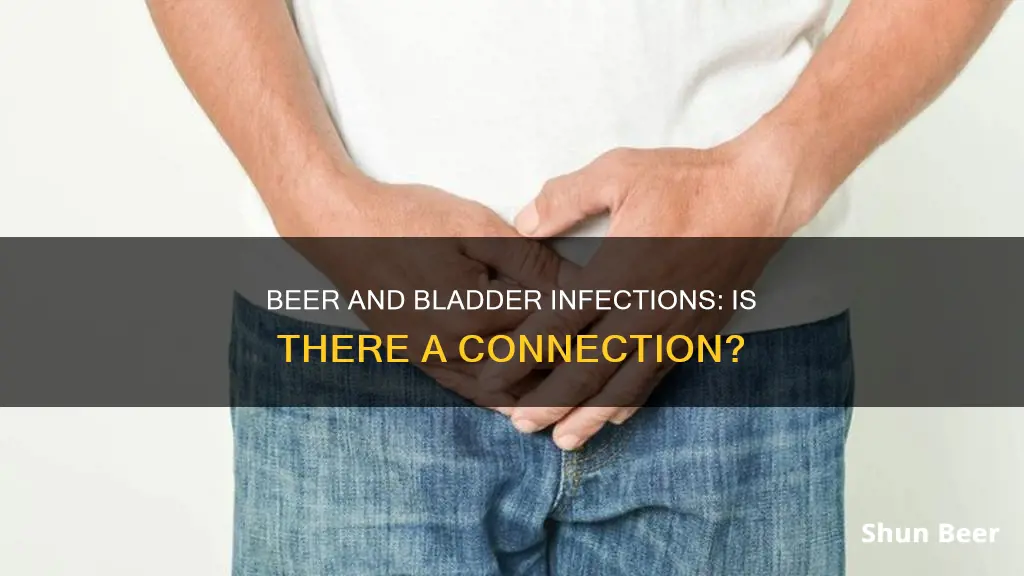
Drinking beer can irritate the bladder, especially if you already have a bladder infection. Beer, like other alcoholic drinks, can increase the acidity of urine, which can worsen the symptoms of a bladder infection. Alcohol can also impair your immune system, making it harder for your body to fight off a bladder infection. While alcohol doesn't directly cause bladder infections, it can increase your risk of getting one.
Can drinking beer cause bladder infection?
| Characteristics | Values |
|---|---|
| Can alcohol cause a UTI? | Alcohol cannot directly cause a UTI, but it can raise your risk of getting one and worsen your symptoms. |
| How does alcohol increase the risk of a UTI? | Alcohol can impair your immune system, irritate your bladder, and increase the acidity of your urine. |
| What are the symptoms of a UTI? | Blood in the urine, pelvic pain, a strong urge to urinate, passing small amounts of urine, and pain during intercourse. |
| What causes a UTI? | UTIs develop when bacteria enter the urinary tract and multiply in the bladder. |
| Risk factors for UTI | Abnormal urinary tract shape or function, certain types of contraception, genetic predisposition, postmenopausal changes in hormone levels, pregnancy, and sexual activity. |
| Foods and drinks to avoid with a UTI | Alcohol, coffee, acidic fruits, citrus fruits, caffeinated drinks, spicy foods, and artificial sweeteners. |
| Recommended drinks for UTI | Water, cranberry juice, herbal tea, and apple cider vinegar. |
What You'll Learn

Alcohol can irritate the bladder lining, causing cystitis
Alcohol is highly acidic, and this acid can irritate the bladder lining. This irritation can feel similar to the pain and discomfort of cystitis, and it can be difficult to distinguish between the two. Additionally, alcohol can cause dehydration, leading to more concentrated urine that can further irritate the bladder and increase the risk of cystitis.
Alcohol can also impair the immune system, making it harder for the body to fight off infections like cystitis. It interferes with the immune system cells and chemical signals, weakening the body's ability to defend against bacteria. This impaired immune function, combined with the irritating effects of alcohol on the bladder, can create an environment conducive to the development of cystitis.
Furthermore, alcohol can negatively impact bladder control. It acts as a bladder stimulant, increasing the urge to urinate. For individuals with incontinence, this may lead to unintentional leakage as they may not make it to the toilet in time. Alcohol can also cause the brain to send impaired signals, confusing the body about when it needs to urinate.
To prevent cystitis and reduce bladder irritation, it is recommended to limit alcohol consumption and increase water intake. Water helps to dilute urine and flush out bacteria, reducing the risk of infection and irritation.
Beer and Steroids: A Dangerous Mix?
You may want to see also

Alcohol can increase the risk of UTIs by impairing the immune system
Alcohol can have a detrimental effect on the immune system, which in turn can increase the risk of urinary tract infections (UTIs). Drinking alcohol does not have to be a regular or heavy occurrence to impact the immune system. Consuming 5-6 drinks in one sitting can suppress the immune system for up to 24 hours.
The human immune system is made up of two parts: the innate immune system and the adaptive immune system. The innate system provides general immunity by responding to viruses, bacteria, and other microorganisms that can cause disease. The adaptive system, on the other hand, deals with immune memory, remembering previous infections and preventing them from reoccurring. Alcohol negatively impacts both parts of the immune system.
Alcohol interferes with the immune system's cells and chemical signals, weakening the body's ability to defend against infection. This suppression of the immune system can lead to a higher risk of infections, including UTIs. Additionally, alcohol can irritate the bladder, impact the body's ability to fight infections, and increase urine acidity, all of which can worsen UTI symptoms.
It is important to note that alcohol does not directly cause UTIs, as they are bacterial infections. However, alcohol abuse is associated with activities that can increase the risk of UTIs, such as sexual activity. Furthermore, alcohol consumption can also cause other bladder problems and irritation without the presence of an infection.
To reduce the risk of alcohol impacting the immune system, it is advisable to drink less or abstain from alcohol consumption.
Kayaking and Beer: What's Legal in Virginia?
You may want to see also

Alcohol can worsen UTI symptoms
Alcohol can irritate the bladder and worsen UTI symptoms. It can also impair your immune system, which might increase your risk of a UTI.
Alcohol is highly acidic, and this acid can irritate the bladder lining. The bladder irritation from alcohol is similar to the feeling of having a UTI. Lowering your intake of irritating (acidic) beverages like alcohol may improve your urinary health.
Alcohol can also cause bladder irritation without an infection. It can be confusing because the pain occurs due to the acid irritating the bladder lining, similar to how you may feel when you have a UTI.
Additionally, alcohol can dehydrate you very quickly. Concentrated urine can irritate and inflame the bladder lining, increasing the risk of a UTI.
Alcohol can also affect how your body handles antibiotics, which are often prescribed to treat UTIs. Mixing alcohol with antibiotics can cause side effects such as drowsiness and an upset stomach.
Heart Condition and Beer: Is It Safe to Drink?
You may want to see also

Alcohol can cause bladder control issues
Additionally, alcohol consumption can impair the brain's ability to send proper signals to the body, leading to confusion about when one needs to urinate. This can result in either a false alarm or, more likely, an accident.
Alcohol also has a diuretic effect, increasing urine production and causing dehydration. This can lead to concentrated urine, which can irritate and inflame the bladder lining, making one more susceptible to urinary tract infections (UTIs). UTIs can cause burning, pain, or pressure during urination, as well as an urgent and frequent need to urinate.
To maintain bladder health, it is advisable to limit alcohol consumption and ensure adequate hydration by drinking plenty of water and clear fluids.
Beer Drinking: A Daily Habit That Can Kill You
You may want to see also

Alcohol can cause dehydration, leading to concentrated urine and UTI
Alcohol consumption can have a detrimental impact on your bladder and urinary tract. While it does not directly cause UTIs, it can increase your risk of developing one and worsen your symptoms. Alcohol is a diuretic, which means that it increases the frequency of urination. The dehydrating effect of alcohol can also cause bladder irritation, such as pain and burning while urinating.
When you drink alcohol, excess urine production can lead to dehydration, resulting in concentrated urine that is dark yellow or brown in colour. This concentrated urine can wreak havoc on your urinary tract, causing irritation and inflammation in the lining of your bladder. The National Institute of Diabetes and Digestive and Kidney Diseases reports that urinary tract infections are one of the most common bacterial infections in women.
UTIs can cause burning, pain, or pressure when you urinate, as well as frequent urination and an urgent need to urinate. Cystitis, a symptom of a bladder infection, causes inflammation and swelling of the bladder lining, which may result in sharp pain, blood in the urine, and increased urgency or frequency of urination.
Alcohol can also impair your immune system, making it harder for your body to fight off infections like UTIs. Additionally, alcohol is highly acidic, and this acid can irritate your bladder lining, causing discomfort even if you don't have a UTI.
To prevent UTIs and reduce bladder irritation, it is recommended to avoid alcohol and increase your water intake.
Beer and Colonoscopy: What's the Verdict?
You may want to see also







